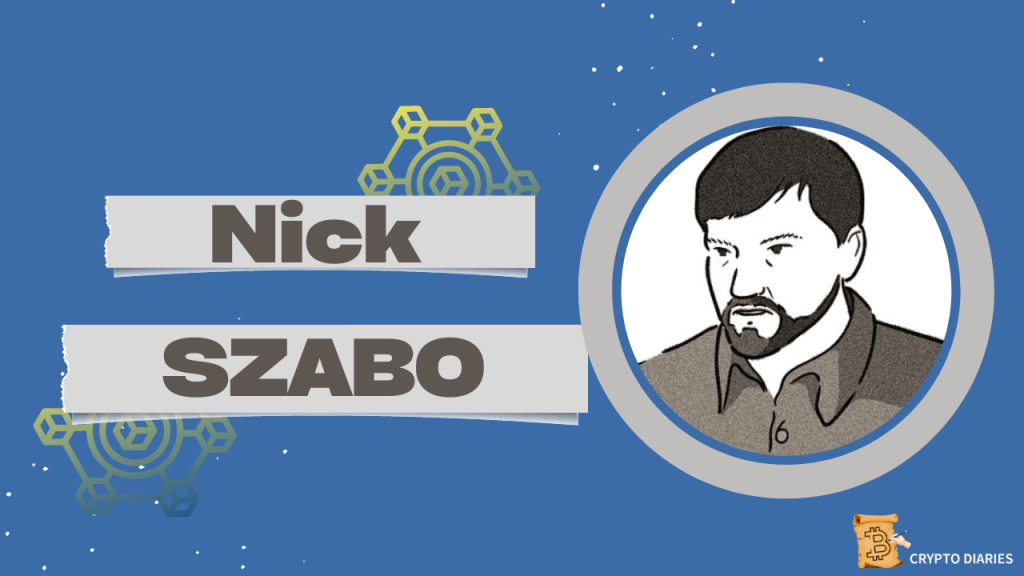Anyone getting into the crypto space is sure to have come across the name Nick Szabo at some point. If you haven’t, don’t fret. We’re here to tell you about him.
The man’s pioneering work in some of the most fundamental cryptography concepts has elevated him to the status of an industry titan. Read on to discover why so many in the crypto community hold Szabo in such high esteem.
Who is Nick Szabo?
Outside of his work in crypto, very little is known about Nick Szabo. It’s unknown whether he’s ever been married or has had children. What’s in the public domain is that he’s an American citizen of Hungarian descent. Szabo is a polymath with a wide breadth of interests and knowledge, ranging from encryption and blockchain technology to the history of economics, law, and money.
He received a Bachelor of Computer Science degree from the University of Washington in 1989 and was awarded an Honoris Causa Doctorate in Social Sciences from Francisco Marroquin University in 2017. Szabo also holds a Doctor of Jurisprudence degree from George Washington University.
He combined his two main interests as a computer scientist and a legal researcher, creating the idea of smart contracts in 1996. Many years later, smart contracts gave rise to a brand-new method of online transactions by becoming the main feature of the Ethereum blockchain.
Despite this, Nick Szabo is still a mysterious figure, but he’s no longer anonymous. He has delivered numerous public talks, served as a consultant on multiple projects, and frequently tweets his opinions on issues affecting crypto and the world.
Nick Szabo’s Body of Work
So, what makes Szabo so influential in the cryptosphere? As earlier alluded to, his work laid the foundation for some of the most enduring developments in the industry.
However, his two most impactful ideas were the Bit Gold project and the concept of smart contracts. Szabo came up with the term and the idea of smart contracts to apply what he terms the “highly sophisticated” principles of contract law and practice to creating electronic commerce protocols between online strangers.
Szabo has also authored many influential papers, including the aptly titled “Trusted Third Parties Are Security Holes” and “Shelling Out: The Origins of Money.”
Let’s now take a more in-depth look at some of the man’s more important works and see how they’ve shaped the crypto space.
Bit Gold: The Precursor to Bitcoin
Nick Szabo’s paper on Bit Gold paved his path to godhood in the cryptocurrency community. Many think this paper marked the birth of Bitcoin (BTC).
Bit Gold represented two fundamental aspects of internet transactions. “Bit” denoted information transmission and reception. At the same time, “gold” showed how closely the system resembled the properties of precious metals, functioning more as a commodity and not relying on so-called trusted third parties.
In the document, Szabo proposed the following steps for the creation of his protocol:
- First, a public string of bits called the “challenge string” is created.
- Next, using a benchmark function, a person generates a proof-of-work (PoW) string from the challenge string.
- The PoW string is then timestamped in a distributed manner to avoid one timestamp service being overly relied on.
- After that, the person adds the challenge string and timestamped PoW string to a distributed title registry for bit gold.
- The next challenge string is created from the preceding string of bit gold.
- To verify the first person’s ownership of a bit gold string, another person checks the title’s unforgeable chain in the bit gold registry.
- Finally, the value of the string of bit gold is assayed by checking and verifying the challenge string, the PoW string, and the timestamp.
By examining Szabo’s Bit Gold proposal, we can see the seeds for Bitcoin. BTC was built and influenced by several different technologies. It didn’t just appear out of nowhere. And although BTC’s pseudonymous founder, Satoshi Nakamoto, didn’t mention Bit Gold in his whitepaper, the parallels and inspirations cannot be more apparent.
There are significant technical differences. For instance, unlike Bit Gold, Bitcoin’s consensus algorithm counts the hashing power as votes for establishing consensus.
Additionally, because of the PoW algorithm’s difficulty adjusting system, BTC is more fungible than its forerunner.
However, the underlying principles of both concepts are the same: getting rid of trusted third parties, addressing the issue of inflation, and developing a trusted, safe online currency system.
Smart Contracts
Smart contracts revolutionized the crypto space. They’re the basis for decentralized finance (DeFi) and the once-popular initial coin offerings (ICOs).
Szabo first discussed the idea of smart contracts back in 1995 in a work called “Smart Contracts Glossary.” A year later, he took things a step further by publishing “Smart Contracts: Building Blocks for Digital Markets.” This effort established the initial framework for using smart contracts on digital platforms.
Screenshot of the first page of “Smart Contracts.” Source: archive.today
In the paper, Szabo used the analogy of point-of-sale systems, such as vending machines, to give a real-world example of an embedded smart contract. According to him, getting a can of soda from a vending machine by inserting the correct coin and pressing the right button was the most basic type of self-executing contract.
However, smart contracts wouldn’t serve a particular purpose in the real world until 2013, when Ethereum was founded.
In the 1996 paper, Szabo outlined four fundamental objectives of smart contracts:
Verifiability is the ability of a principal to demonstrate to an arbiter that a contract has been executed or violated or the arbiter’s capacity to obtain this information through other methods.
Observability: The principals’ ability to monitor each other’s contract performance.
Privity is the idea that parties should only have access to information and have influence over contract terms and performance to the extent necessary to carry it out.
Enforceability: This is assessed in the possibility that a contract can be enforced.
According to Szabo, smart contracts should be able to self-execute when all conditions are satisfied. This allows both parties to monitor each other’s compliance with the terms of the agreement, confirm that the terms have been met, disclose only the information necessary to carry out the contract, and, finally, lower the cost of enforcing the agreement.
Influential Writings
If you are looking for a more nuanced understanding of the cryptoverse, Nick Szabo’s uncanny grasp of history, money, law, and cryptocurrency makes his writings invaluable. He has written extensively and authoritatively on several topics, including cryptography, online privacy, the history of money, and the state of crypto and blockchain.
In 1997, he wrote a paper titled “Formalizing and Securing Relationships on Public Networks.” In the article, Szabo discussed the significance of the digital age for humanity and the profound shift in the kinds of relationships that can be built on trust.
He explained how the advent of computers could drastically alter how people interact at work and with one another. Szabo further stated that the main tools for those improvements would be smart contracts and cryptography.
In 2001, Szabo published a paper titled “Trusted Third Parties Are Security Holes.” The paper highlighted several security issues in trusted third parties, with the key takeaway being that trusted third parties simply don’t exist.
In 2002, Szabo authored “Shelling Out: The Origins of Money,” where he thoroughly examined the history and evolution of money up to its current state. Two years later, he introduced the world to the Work test mechanism, which employs computing resources to produce a store of value. The concept is quite similar to one of the fundamental ideas of Bitcoin, which was launched five years later.
Could Nick Szabo be Satoshi Nakamoto?
One of the enduring mysteries of the crypto era is the true identity of Bitcoin founder Satoshi Nakamoto. And, despite his repeated denials, some believe Nick Szabo is the man behind the pseudonym.
Why is this so? Well, conspiracy theorists have presented several reasons to back their claims. Foremost among them is Szabo’s development of Bit Gold, which is seen as an influential forerunner to BTC. The early prototype was a significant catalyst for some innovations that would later define BTC.
Additionally, Szabo and Satoshi enlisted the help of the same group of individuals for comments and counsel on their projects.
Satoshi Nakamoto Statue in Budapest. Source: Wikimedia Commons
But the icing on the cake is a study dubbed “Project Bitcoin” by a team of forensic linguists from Aston University, which examined the linguistic connections between Satoshi’s Bitcoin whitepaper and the works of eleven people who were frequently suspected to be the BTC creator.
Dr. Jack Grieve oversaw a team of 40 final-year students that conducted the study. And after its conclusion, he said the following: “The number of linguistic similarities between Szabo’s writing and the Bitcoin paper is uncanny. None of the other possible authors was anywhere near as good a match.”
Szabo’s development of Bit Gold, the linguistic similarities between him and Satoshi, and their near-identical justification for why cryptocurrency should have value, all make for a pretty strong case supporting the claims that Nick Szabo is Satoshi Nakamoto.
However, Satoshi’s real identity is yet to be conclusively determined. We’ll probably never know whether it’s Szabo, someone else, or even a group of people.
Final Thoughts
There isn’t much to say about Nick Szabo’s personal life. However, the corpus of his work demonstrates how accomplished he is in the fields of blockchain, law, technology, history, cryptography, and business.
Despite the uncertainty surrounding his identity as Satoshi Nakamoto, he’s made significant contributions, has a solid reputation, and is well-liked in the crypto community.
His blog, Unenumerated, is still one of the best-written blogs on crypto, distributed ledger technology, law, business, and cryptography.
He’s also one of the most well-known authorities in computer science, and he frequently lectures to share his extensive expertise with others.
Even today, his views on cryptocurrency are highly regarded and essential. As such, the legacy and influence of Nick Szabo will endure for as long as there is crypto.

